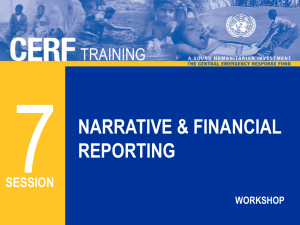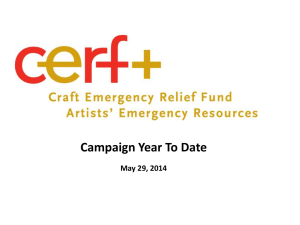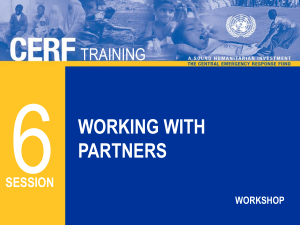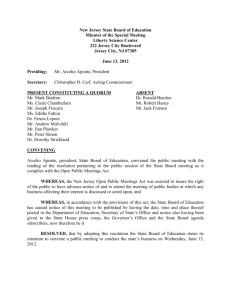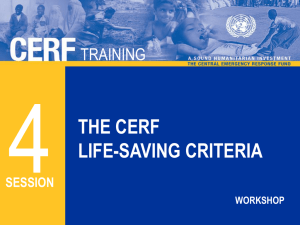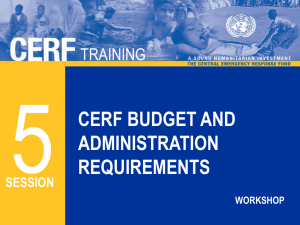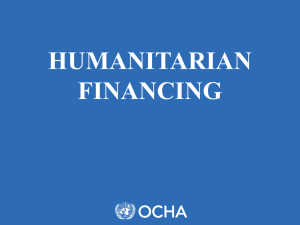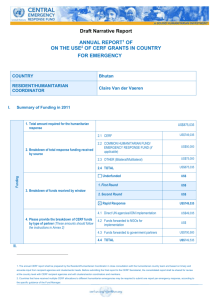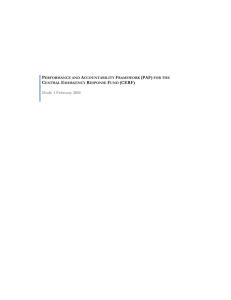Solicitud CERF. NFIs. UNDP16jul JPO modificado
advertisement
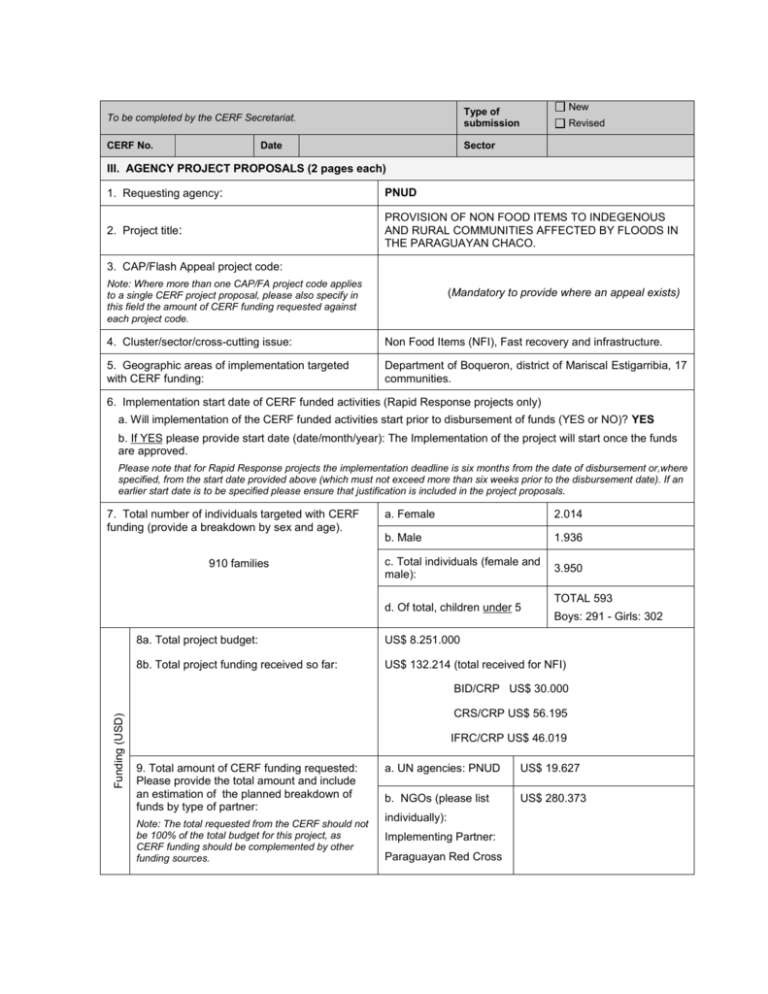
To be completed by the CERF Secretariat. Type of submission CERF No. Sector Date New Revised III. AGENCY PROJECT PROPOSALS (2 pages each) 1. Requesting agency: PNUD 2. Project title: PROVISION OF NON FOOD ITEMS TO INDEGENOUS AND RURAL COMMUNITIES AFFECTED BY FLOODS IN THE PARAGUAYAN CHACO. 3. CAP/Flash Appeal project code: Note: Where more than one CAP/FA project code applies to a single CERF project proposal, please also specify in this field the amount of CERF funding requested against each project code. (Mandatory to provide where an appeal exists) 4. Cluster/sector/cross-cutting issue: Non Food Items (NFI), Fast recovery and infrastructure. 5. Geographic areas of implementation targeted with CERF funding: Department of Boqueron, district of Mariscal Estigarribia, 17 communities. 6. Implementation start date of CERF funded activities (Rapid Response projects only) a. Will implementation of the CERF funded activities start prior to disbursement of funds (YES or NO)? YES b. If YES please provide start date (date/month/year): The Implementation of the project will start once the funds are approved. Please note that for Rapid Response projects the implementation deadline is six months from the date of disbursement or,where specified, from the start date provided above (which must not exceed more than six weeks prior to the disbursement date). If an earlier start date is to be specified please ensure that justification is included in the project proposals. 7. Total number of individuals targeted with CERF funding (provide a breakdown by sex and age). 910 families a. Female 2.014 b. Male 1.936 c. Total individuals (female and male): 3.950 d. Of total, children under 5 TOTAL 593 Boys: 291 - Girls: 302 8a. Total project budget: US$ 8.251.000 8b. Total project funding received so far: US$ 132.214 (total received for NFI) Funding (USD) BID/CRP US$ 30.000 CRS/CRP US$ 56.195 IFRC/CRP US$ 46.019 9. Total amount of CERF funding requested: Please provide the total amount and include an estimation of the planned breakdown of funds by type of partner: Note: The total requested from the CERF should not be 100% of the total budget for this project, as CERF funding should be complemented by other funding sources. a. UN agencies: PNUD US$ 19.627 b. NGOs (please list US$ 280.373 individually): Implementing Partner: Paraguayan Red Cross c. Government: US$ 0 e. Total: US$ 300.000 10. Briefly describe the overall project, including information on how CERF funding will be used to support lifesaving/core humanitarian activities.1 Describe the profile of beneficiaries and how gender equality is mainstreamed in project design and implementation (ensuring that the needs of women, girls, boys, and men are met equally). Include relevant assessment data. -------------- GUIDANCE - Delete when field is completed ------------------------Please briefly describe here: the overall project information on how CERF funding will be used to support life-saving/core humanitarian activities the profile of project beneficiaries how gender equality is mainstreamed in project design and implementation (ensuring that the needs of women, girls, boys, and men are met equally) Relevant assessments and assessment data. ------------------------------------------------------------------------------------------------------------- The Western Region or Paraguayan Chaco covers 61% of the country and less than 3% of the country population lives in this region. The Chaco region is constituted by the Departments of Presidente Hayes, Boqueron and Alto Paraguay, which have the lowest Human Development Index (HDI) levels in the country. 49.3% of total Native Indigenous Population (NIP) is concentrated in the Paraguayan Chaco, representing 38.9% of the Chaco population, while they represent only 0.90% of the Paraguayan Eastern Region estimated total population. According to data provided by the General Office of Surveys, Statistics and Census, there is an average of 5 members per family in the country. The most affected ethnic groups by the floods live isolated in rural areas in the low Chaco (Pilcomayo River area). The indigenous population pyramid keeps the characteristic shape of a predominantly young population structure, with a wide base, a clear high fertility index which gets rapidly lower in the adult ages due to high mortality rates they are exposed to. The identified groups under the highest risk during the floods’ effects are children (boys and girls), pregnant women/ women in breastfeeding period, old people, handicapped peoples and women. The Paraguayan Red Cross, jointly with the UNDP, has identified the need of providing assistance to 910 indigenous and rural families from 18 communities of the Department of Boqueron, in order to mitigate the most urgent needs of these families affected by the floods caused by the Pilcomayo River and the registered rainfalls in the Department of Boqueron. The expected type of assistance to be provided consist in the provision of blankets and folding beds, keeping in mind that frost period is near and that under their home sleeping conditions (on the ground) they put the good health of the people under risk exposing them to humidity. The majority has lost the mentioned items and this fact leads to worse health conditions for the people. Metal sheets will be also provided to houses affected by alluviums and accumulation of sediments in the areas populated by the communities which urgently need to recover their houses, specifically to 1 The CERF Life-Saving Criteria, which specify sectoral activities that the CERF can fund, are available at http://cerf.un.org. cover their roofs. Taking into account that the area is also exposed to droughts, the coverage will serve also as a water collector. The in situ evaluation was initially carried out by the National Secretariat for Emergencies (SEN) and later on by a UNDAC mission that was sent to the country to make a quick in situ evaluation likewise, which leaded to a CERF funds request. The results included in the report submitted on July 12, 2012 show the needs by sector. This report presents a brief analysis of the needs, performed actions and gaps and has worked as the basic input for the justification and elaboration of this project. In this context, the results of such evaluation in the Non Food items (NFI) section, mention that the current situation is that the existing humidity and low temperatures of this season increase the vulnerability of the population which is under bad nutrition, and besides, the health condition is deteriorated because of the lack of house coverage (roof), since the weather forecast provided by the Meteorology and Hydrology Office (DMH) for the next three months show that low temperatures and rainfalls are expected. The report also mentions that isolated communities exist because of the bad condition of roads caused by the last rainfalls registered in the region, which are not normal at this time of the year plus the bad condition of houses (deprivation, overcrowding and, in some cases, lack of roofs). Also, 3.000 houses are reported as destroyed and 1.500 dare reported as damaged (SEN). It is worth to mention that the affected population does not count with refuges anymore, which were dismantled in view of the improvement of the weather condition. The people went back to their houses by their own decision. However, new atypical and intense rainfalls drove to a worse deterioration of the existing conditions which caused that nowadays the communities are exposed to cold weather and rain due to the bad infrastructure of their facilities which were not yet restored. The implementation of this project will be carried out by the Paraguayan Red Cross given their extensive experience in humanitarian relief and important local presence. The availability of field branches country wide, including the Chaco Region, and their operational capacity makes them the most adequate implementing partner for this particular project. 11. Description of the CERF component of the project (2 pages). Please describe the project as per the three headers provided below. (a) Objective(s) To provide emergency assistance to 910 indigenous and rural families from Mariscal Estigarribia Department of Boqueron that are affected by the floods, cold spells and rainfalls, to distribute Non Food items. (b) Activities Coordination with departmental, municipal and community leaders and representatives and with the SEN. To revise and update the affected families census To provide metal sheets to repair the facilities that could provide immediate hosting (roofs for houses) To supply Non Food Items to affected people to help them to put up with cold spells (blankets and folding beds) To coordinate monitoring visits to the field with the UNDP staff Coordination work meetings Joint monitoring visits to the field Advance reports Technical and financial final report (c) Expected Outcomes and Indicators (please use SMART 2 indicators) Expected outcome 1: To assist 532 indigenous and rural families from the department of Boqueron – Mariscal Estigarribia, providing blankets and folding beds for family groups with 5 members. Outcome indicator 1: 532 families receive 3 queen size blankets and three 0.80 * 2.20mt canvas folding beds in one single delivery within the first four execution months. # Article Description Quantity 1 Blanket Queen size, wool 3 2 Folding bed Canvas, 0.90 * 2.20mts, folding beds 3 Outcome 2: To provide with six (6) metal sheets to each of the 378 families affected by the floods at the Department of Boqueron for the restoration of their houses coverage (roofs) in order to protect them against the forecasted cold spells and rainfalls. Outcome indicator 2: 378 families of a district in Boqueron receive 6 units of 0.90 * 3mt galvanized metal sheets with accessories (nails, hammer and wires) in one single delivery within the first four months. # Article Description Quantity 1 Zinc metal sheets 0.90 wide * 3mts galvanized 6 2 Hammer Common 1 3 Wires Fine 10 mts 4 Nails (tacks) Special for installation of metal sheets 3 packs 12. Implementation Plan: Please include information on the mechanisms for implementation, grants to cooperating partners, the duration for implementing CERF-funded activities, monitoring and reporting provisions. UNDP and Paraguayan Red Cross have agreed to sign a Memorandum of Understanding (MOU) that will define the implementation mechanisms. The PRC have the operative expertise and the technique regarding the purchase and delivery of non food items. The management arrangements are divided into administrative and operative arrangements. Regarding administration, once the project funds are received, UNDP will transfer the programmable amount to the PRC for its implementation under the conditions established in the MOU. The PRC will administrate the funds under UNDP rules and procedures. In this framework, the PRC and UNDP will work in close coordination for the administration of the project budget. 2 SMART indicators are: specific, to avoid differing interpretations; measurable, to allow monitoring and evaluation; appropriate to the problem statement; realistic and able to achieve; time-bound indicating a specific period of time during which the results will be achieved. Indicators must be designed to enable you to identify the different impacts (intended and unintended) your project has on women, girls, boys, and men. With regards to the operative aspect, the project will be executed by the PRC in close coordination with UNDP, SEN and local Governments. The PRC will hire personnel as necessary; it will also be in charge of purchasing goods and items and hand them over to the communities. The PRC will submit a technical/financial report to UNDP in a monthly basis and a monitoring/follow up report every two months. The project activities will only be started after receiving the funds from the CERF secretariat. It is worth to mention that there will be no activities performed in advance. - Schedule of activities to be implemented Actions To coordinate with departmental, municipal and community leaders and representatives and with the SEN To revise and update the affected families census Purchase of ítems (metal sheets, accesories, blankets, folding beds) Months 1 2 3 4 5 x x x x x x x x X x x x X x x x x x X x x x x x X x x To provide metal sheets to repair the facilities that could provide immediate hosting (roofs for houses) To supply Non Food items to affected population to help them to put up with cold spells (blankets and folding beds) Coordination meetings with UNDP staff for monitoring actions in the field Advance reports Monitoring reports Technical and financial final report 6 x x X X 13. CERF Project Budget Please use the template below without modifying the section headings. Wherever possible and relevantplease provide a detailed breakdown of items (unit, quantity, unit costs) and costs for each budget line for the CERF component of the project. Where breakdown of unit, quantity and unit cost is unavailable or unnecessary, please provide total amount of the item along with sufficient description of cost content. Please add additional rows, as needed. For further guidance on budget format please refer to the CERF application budget guidelines annexed to this document and available at http://cerf.un.org. Cost Breakdown BudgetLines Unit Quantity Unit Cost Total(USD) A. Supplies/commodities/equipment/transport(please itemize expendable operational inputs (e.g. quantity of food, medical supplies etc and asset purchases)) Sub-Total A: B. Personnel (staff, consultants, Trips) (please itemize Trips costs, salaries and entitlements of UN staff and consultants) Sub-Total B: C. Training of counterparts Sub-Total C: D. Contracts (please list and provide general cost breakdown or description of inputs or outputs per implementing partner) Paraguayan Red Cross3 is the implementing partner Galvanized metal sheets (6 sheets per family) Sheets 2,327 23 53,531 Hammer (one per family) Hammer 378 5 1,890 Wires (one 10 mts reel per family) Reel 381 2 762 Nails (tacks) (three packs per family) Pack 1,134 2 2,268 Blankets (three units per family) Blankets 1,740 41 71,340 Folding beds (three units per family) Folding beds 1,740 48 83,520 Transportation (rent for distribution) Trips 20 713 14,260 Fuel/tolls Trips 20 956 19,120 Responsible in field Month 6 1,000 6,000 Technical/operative Month 6 657 3,942 DSA: 5 persons * US$47,4 per day * 5 diays= US$1.187 Trips 20 1,187 Sub-Total D: 23,740 280,373 E.Other direct costs Sub-Total E: Subtotal project requirements Subtotal project requirements amount 280.373 Indirect program support costs (PSC)(not to exceed 7% of subtotal project costs) PSC rate PSC amount Total CERF project cost 3 19.627 300.000 The Paraguayan Red Cross is the implementing partner of this project. They will carry out the acquisitions of the NFIs and execute the project. UNDP will carry out activities such as coordination with local and central authorities and the monitoring of the project.
